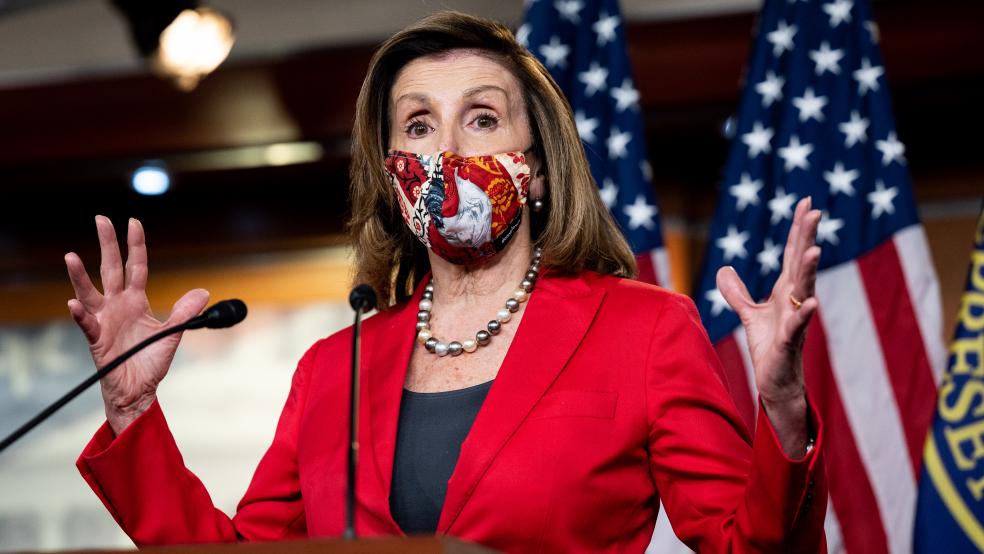The election may have changed the political landscape in Washington, D.C., but even before the results are final, congressional leaders and the Trump administration signaled Friday that one thing hasn’t changed: the partisan stalemate surrounding another coronavirus stimulus bill.
Senate Majority Leader Mitch McConnell (R-KY) again called for a smaller, targeted relief package, saying that the October jobs report released Friday — which showed that the unemployment rate had fallen to 6.9% — indicated that narrow legislation is all that’s needed. (See below for more on the jobs report.)
“Our economy is really moving to get back on its feet. That I think clearly ought to affect what size of any rescue package we additionally do,” McConnell said at a news conference in Kentucky. “I do think we need another one, but I think it reinforces the argument that I’ve been making for the last few months that something smaller — rather than throwing another $3 trillion at this issue — is more appropriate, with it highly targeted towards things that are directly related to the coronavirus, which we all know is not going away until we get a vaccine.”
White House economic adviser Larry Kudlow said Friday that, given stronger-than-expected economic data, the Trump administration — which had shifted positions over weeks of negotiations on another stimulus bill, sometimes from one day to the next — would oppose a package along the lines of the roughly $2 trillion deal that Treasury Secretary Steven Mnuchin had been negotiating with House Speaker Nancy Pelosi (D-CA).
“We’re not interested in, you know, two or three trillion,” Kudlow said, calling instead for a “targeted package to specific areas.”
Pelosi has for months rejected that approach, and she did so again on Friday. “It doesn’t appeal to me at all because they still have not agreed to crush the virus,” Pelosi said, adding, “that isn’t something we should be looking at.”
In a statement, the speaker said that the economic data and the surge in coronavirus cases called for a more comprehensive response: “With millions more Americans stuck in long-term unemployment, a million fewer teachers and education jobs compared to a year ago, nearly 8 million people having fallen into poverty and up to 17 million children food insecure, we must crush the virus and protect the lives and livelihoods of the American people.” She called for Republicans to return to the negotiating table.
What’s next: With lawmakers set to return to the capital next week for a lame-duck session of Congress, the Trump administration is indicating that it will let McConnell be the point person for negotiations with Pelosi rather than have Mnuchin resume talks, The Washington Post’s Erica Werner reports. McConnell said this week that he could back some aid to state and local governments, a Democratic demand that had been a major sticking point in Pelosi’s negotiations with the administration.
“But with McConnell and Pelosi so far apart at the outset, it’s unclear where compromise might lie — and highly uncertain what Trump might be willing to sign on his way out of office,” Werner writes. “The negotiations might hinge in part on a Dec. 11 deadline when government funding runs out and a new spending bill will have to pass to avert a government shutdown.”
Election uncertainty may still loom over any talks, too. While Republicans appear likely to keep control of the Senate, Democrats still have a chance to wrest it away, depending on the outcome of two January runoff elections in Georgia. Those races, and the prospect that Joe Biden will be inaugurated in late January, may make Democrats less likely to compromise with McConnell during the lame duck.
Pelosi announced that she’s running for another term as speaker and she told reporters Friday that she saw her leverage in coronavirus relief talks increasing, rejecting that idea that the election would force Democrats to swallow a narrower bill. “She exuded confidence in a Biden presidency, telling reporters once he’s inaugurated he would be able to use the bully pulpit to shepherd a large spending bill that includes infrastructure construction -- even through a Senate continuing under Republican control,” Bloomberg News reports.
“The public wants a big jobs bill,” Pelosi reportedly said. “Now we have the upper hand.”
Republicans obviously see it much differently.





